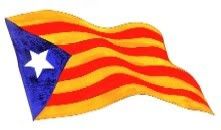
Today saw the culmination of a series of unofficial referendums on independence for Catalunya which started in September 2009 in the small town of Arenys de Munt. I've written about them before here, here, here and here.
Further rounds have been held since then which I didn't write about. Thinking back, it was probably because of a sense of disappointment that the turnouts were getting progressively lower as referendums were held in the larger towns and cities. Turnout is the critical factor because the percentage of people who vote Yes is usually about 95%. People who didn't want independence didn't vote No, they just ignored the poll ... as did those who didn't care one way or the other about independence, or did have an opinion but didn't think the vote mattered, for the polls have been entirely unofficial.
It seemed reasonable to conclude that the appetite for independence was stronger in smaller towns; but that in the cities, with their significantly larger proportions of immigration from Spain and other countries, there might be less of a Catalan identity and therefore less appetite for independence.
For an account of what happened, I could do no better than quote directly from the Barcelona Decideix site:
On September 13th, 2009, the inhabitants of the Catalan town of Arenys de Munt voted in a referendum proposing Catalan independence from Spain. The terms of the question that was asked in the poll were: “Do you agree that Catalonia should become a social, democratic and independent state in its own right, as a member of the European Union?” About 40% of the town’s 6,500 eligible voters participated in the poll and more than 96% of votes were in favour of Catalan independence ...
On December 13th, 2009, 167 towns held a referendum on the same terms as the Arenys de Munt consultation. About 28% of the 700,000 eligible voters participated in this first massive wave of referendums, and 95% voted Yes to independence. Organized privately, with almost no media coverage, and based on volunteer work, these results were a great success. Even large towns close to Barcelona, such as Sant Cugat, had a high turnout (25%) and a clear result in favor of independence (92.3%).
The second wave of referendums took place on February 28th, 2010, when another group of 80 towns organized their referendums. 21.5% of the 300,000 eligible voters participated, and 92% voted Yes. The third wave took place on April 25th, 2010, when 213 towns organized the referendum and 1.3 million citizens were eligible voters. Two of the cities where the referendum was held had a population of over 100,000 inhabitants (Lleida and Reus); four between 50,000 and 100,000 (Girona, Manresa, Granollers and Mollet); and two between 30,000 and 50,000 (Igualada and Figueres). The turnout was around 18%. On June 20th a fourth wave was held, this time mainly in large cities located in the Barcelona metropolitan area. The majority of the population in these centres issues from the first massive migration wave of the 1960s, and many people have Spanish origins. The turnout was 14%.
Barcelona Decideix
But the news has just been announced that the turnout in Barcelona was 21.37%. This is an amazing result and a complete reversal of the trend. The organizers had thought that a good result would be to get over 10%.
10A Barcelona Referendum makes history with 21.37% turnout
“We could never, even in our wildest dreams, have imagined a turnout like this”. Alfred Bosch, the Barcelona Decideix spokesman, was visibly moved as he announced the final turnout figure in the Referendum on Independence for Catalonia in the city of Barcelona. “We’ve made history."
So how do we explain what has happened? This is how I see it. Events last year were dominated by the elections to the Catalan Parliament in November. There was a concerted effort to make independence the crucial issue in the election, and to elect enough deputies with a pro-independence mandate to make a unilateral declaration of independence. But party squabbles frustrated that idea and it fell spectacularly flat.
The people of Catalunya were really much more interested in normal politics, wanting to get rid of the broad left coalition—made up of the socialist PSOE, the pro-independence ERC (Plaid Cymru's sister party in the EFA) and the left-green ICV—in favour of CiU, the centre-right nationalist party that has traditionally been pro-autonomy but not pro-independence. CiU won 62 of the 135 seats, which was quite enough to form an effective minority government.
From CiU's perspective, they were much more interested in getting into government than to press for a change in Catalunya's constitutional position. Of course that's not to say they didn't want things to change, but the main change they had in mind is to get the same sort of financial arrangements for Catalunya as the Basque Autonomous Community and Navarre already enjoy. Those two communities collect their own taxes directly and hand over a negotiated sum to Madrid in a quasi-federal arrangement. But Madrid collects Catalunya's taxes centrally and hands them the equivalent of Wales' and Scotland's block grant. As Catalunya is wealthy, it gets back a lot less than it contributes. 10% of its GDP is syphoned off.
Parallel to this, Spain is not exactly in a healthy financial position, and is probably next in the queue for an EU loan package now that Portugal has had to take one. This is a time of severe cutbacks, unemployment and austerity measures, so it is hardly surprising that there is considerable friction between Spain and Catalunya, with Catalans asking why they should take more of a hit than they deserve for the sake of Greater Spain.
Therefore the increase in support for independence shown in this referendum is probably a reflection of rising discontent at the way Spain treats Catalunya as if it were a cash cow.

But on top of this, there seems to be a growing realization within CiU that its traditional position of greater autonomy within Spain is not likely to be realized. Things point to Spain wanting to recentralize rather than move towards becoming a federal state. So it is very significant that Jordi Pujol, the former Catalan President and grand old man of Catalan politics shifted his position and has voted for independence in this referendum. People were able to vote in advance, and him doing so undoubtedly had an effect on the high turnout today.
More important still is that Artur Mas, the leader of CiU and current Catalan President, voted for independence too. This opens the very real possibility that CiU will change its position from being pro-autonomy to pro-independence. As I noted in this post, an opinion poll in 2009 showed that 56.5% of CiU voters would vote for independence, with only 29.8% against; so changing the party's stance on independence would do it more good than harm.
All in all today has been a very positive day for those who want to see an independent Catalunya. I can't wait to see what happens next.



5 comments:
Excellent and very realistic article about the actual situation in Catalonia. Congratulations
This is a good result. I'm not sure what it will achieve in the short term, but, coupled with the Spanish state continual outlawing of the republican left in the Basque Country (Sortu) then it places more pressure on Madrid to come to some arrangement with the non-Castillian nations within Spain.
Basically, although the Labour Party (PSOE) in Barcelona wanted to ignore the vote and put Catalan demands on the back-burner, a growing number of Catalans are asking if independence is good enough for Switzerland then surely it's an option the Catalans should be able ask and vote on. http://ht.ly/4tpES
The Catalans and Basques can't be taken for granted.
CiU are being very cagey about this - and rightly so. Artur Mas did vote yes, but he did so last week, on his own, and out of the glare of media cameras. The other portion of the federated party CiU (Unio-UDC) to which Mas belongs currently positions itself strongly against independence and Unio's no2 actually voted yesterday, but voted 'no'. Mas is currently between a rock and a hard place, and this will become evident on Wednesday when CiU will be asked to support a draft measure on independence driven forward by the currently imploding SI political formation, who nevertheless are making all nationalist parties show their cards. Unkind critics will say that the CDC element within CiU have voted en masse for independence of a Sunday, simples, but when it comes to taking forward the political ramafications of Sunday's events, then they will revert to the position that they do not wish to jeopardise the trust of those who voted CiU into power in November, since independence was not in their manifesto.
Despite this, I see CiU as being in a strong position. A recent poll 5 months ago put those favouring independence as over 20% for the first time. The 'Barometre' poll today puts this at 34%. However, what is very significant, and the sample was 5,000, was that 13% of those who naturally vote PP in Catalonia, and 26% of the centralist PSC, would also vote for independence. It would now seem that independence has come in from the cold, and is now not only a respected orientation, but it is gaining ground amongst political demographies which simply could not have been aligned with it even one year ago. Yes, the Pujol reorientation is important, but more so the Constitutional Court's decision last year to legitimate a rolling back of 30 years of Catalan autonomy. In response to this, 1.3 million voted with their feet, literally, last July. Yesterday confirmed this is still the case. Eyes down for Wednesday.
Congratulations on a really good summary of the situation in Catalonia. I was involved in Barcelona Decideix and can vouch for the accuracy of all the comments.
As you may know, CiU abstained in the vote in Parlament on independence only days after Barcelona Decideix (71 abstentions, 49 yes, 13 no, a total of 133 votes).
CiU's spokesman said "We haven't avoided the debate, many of us are in favour of "what" it raises, which doesn't imply that we agree with "how" or "when". He stressed the significance of President Mas' call for a new transition rather than a permanent harking after independence.
But now further tension is being introduced by the Spanish government's high-handed calls on Catalonia to make still further cuts in spending, the Govern's refusal to concede, and so the President may have to firm up his attitudes. The spiralling discontent continues.
Watch this space, I'm sure it will all be reported in this excellent blog ...
Just to correct the above figures - there were actually 49 effective nos (socialists, conservatives and citizens' party) and only 13 yes votes (ERC republican left, Solidaritat and Joan Laporta), with CiU and ICV-EUiA greens/communists abstaining.
Post a Comment